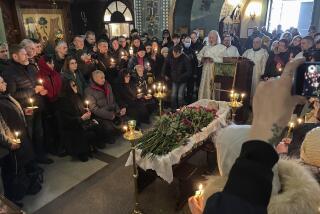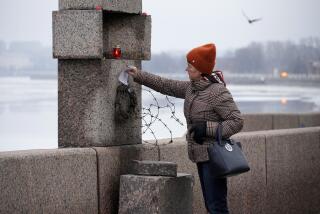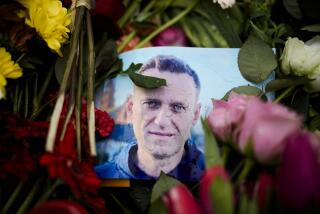Plans Blocked for Czar’s Death Memorial : Russia: A metal cross, a small carved stone, a chipped sign appealing for donations, the abandoned framework of a tiny chapel stand as mute evidence of what might be.
- Share via
YEKATERINBURG, Russia — Traffic roars past the spot where Russia’s last czar and his family met a grisly end nearly eight decades ago. Construction materials litter the largely vacant lot.
The sins of Russia’s past and present are colliding in this Ural Mountains city, where despite years of debate and fund-raising there is no permanent memorial to one of history’s most infamous massacres.
Corruption, confusion and apathy--mirroring the nation’s contemporary problems--all are to blame.
Even the purported chief executioner has a more impressive monument than the victims’ meager one.
“It’s a pity,” said Alexei Katayev, a local history buff looking over the unkempt and nearly deserted site where Nicholas II; his wife, Alexandra; their five children, and four attendants were murdered in 1918.
“It should be properly marked and registered,” he said. “People should remember what happened here.”
A metal cross, a small memorial stone, a chipped sign appealing for donations and the abandoned framework of a tiny chapel stand on the plateau overlooking this industrial city of 1.3 million people. During the Communist era, it was named Sverdlovsk after the official who arranged the murders.
A statue of heavily muscled Bolshevik working-class heroes appears to watch over the site from across the road in the former People’s Revenge Square.
It was here on July 17, 1918, that a Bolshevik firing squad, on orders from Vladimir Lenin, shot the exiled royal family in the basement of a nobleman’s house. The remains were dumped in an abandoned mine outside town.
The KGB ordered the building razed in 1977 because it feared the house would become a pilgrimage site.
A decade later, in the age of glasnost, services were finally allowed at the site, and authorities and the Russian Orthodox Church agreed that a full-scale memorial should be built.
Proposals were grandiose: A museum. A hotel. A seminary. Wall calendars even depicted a magnificent white marble cathedral there.
The site was given in 1990 to the church, which had close ties to the czars. A “substantial amount” of money reportedly was raised, but it vanished two years ago.
Prosecutors are investigating accusations that the chief fund-raiser, a policeman turned clergyman, spent the money on “drinks and debauches.”
City and church leaders blame each other for the failure to erect a memorial.
“The city is all in favor of this project, but there just isn’t enough money for it,” said Maya Mikhailova, a city spokeswoman. “We believe the church bears more responsibility.”
Bishop Nikon, the prelate of Yekaterinburg, declined to say how much the church has raised recently. The day he met with a reporter, a bulldozer was paving a long church driveway for a big celebration marking his 35th birthday.
“I have been feeling pressure from the many swindlers who want to get their hands on this money, but I have resisted,” said the bishop, who conducts Saturday services at the site.
He said a small, temporary church would be erected within a year. “Believers and sponsors” should pay for a permanent church, Nikon said.
Asked when that would happen, he said: “Maybe in 20 years, maybe in two years--according to God’s will.”
Like the memorial, the remains of the czar’s family have been in limbo since they were unearthed in 1991.
American, British and Russian forensic scientists have positively identified them. But a special government commission has yet to issue a ruling that would clear the way for burial in St. Petersburg, the former imperial capital.
Public interest seems to have faded, but the czar’s fate still strikes some nerves in Yekaterinburg.
Carnations and lilacs lay near the memorial stone on a recent day.
In a wooded cemetery across town, vandals regularly strike the imposing tombstone of Pyotr Yermakov, the commissar who claimed to have pulled the trigger on the czar.
The same one-word message always is left on the grave, in blood-red paint: “Killer.”
More to Read
Sign up for Essential California
The most important California stories and recommendations in your inbox every morning.
You may occasionally receive promotional content from the Los Angeles Times.













